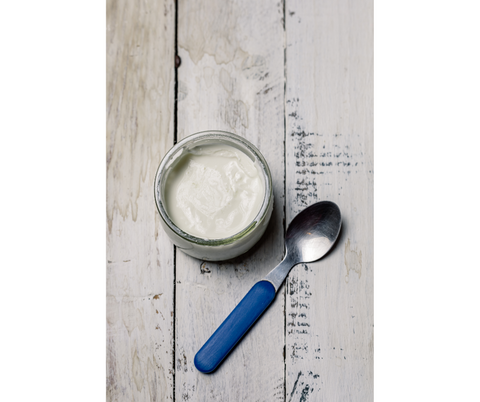Lactobacillus Bulgaricus – why Bulgarians live longer!
Lactobacillus delbrueckii subsp. Bulgaricus, or L. bulgaricus for brevity, is a gram-positive bacteria found in yoghurt and cheese. This hungry bacterium can ferment fructose, glucose, and lactose to produce lactic acid (and a few other things), making it a helpful microbe for keeping the gut and genitourinary tract happy and healthy. L. bulgaricus is also, arguably, the main reason for today’s massive interest in probiotics!

What is L. bulgaricus?
Lactobacillus delbrueckii subsp. Bulgaricus, or L. bulgaricus, is one of two key starter cultures for yoghurt production. The other is Streptococcus thermophilus. These microbes have a symbiotic relationship, supporting each other’s activities to create delicious fermented dairy products from milk (and other foods).
When Elie Metchnikoff dreamed up the idea of probiotic supplements, he was thinking largely about L. bulgaricus found in yoghurt. Metchnikoff was a Russian biologist and Nobel Prize laureate who realised that long-living Bulgarians seemed to consume an awful lot of yoghurt. He decided that it was the lactobacilli in this yoghurt that helped these Europeans live long, healthy lives and that the benefits might be enjoyed by others if they also consumed what became known as L. bulgaricus.
While Metchnikoff brought attention to the bacteria in yoghurt, it was a graduate student who first isolated L. bulgaricus. Strains of this bacteria have also been isolated in other countries famous for fermented dairy foods, including China, Mongolia, Russia, and Turkey. If things had gone a different way, L. bulgaricus could well have been L. turkus instead!
Topping up with L. bulgaricus
Elie Metchnikoff believed that aging and disease were the result of protein putrefying in the bowel due to undesirable bacteria. He also thought that a good application of beneficial bacteria, namely L. bulgaricus, could help prevent this putrefaction and was what led many Bulgarians to live well into old age.
He wasn’t far wrong, it turns out. Indeed, L. bulgaricus is one of those probiotic species which doesn’t like to stick around in the bowel and must be consumed regularly to keep levels topped up. Metchnikoff did this by drinking fermented milk every day of his life!
More recently, researchers have found that L. bulgaricus can survive the intestinal tract intact, making it a pretty robustprobiotic species (Mater et al., 2005). Happily, you don’t have to drink sour milk to reap the benefits of L. bulgaricus.
How L. bulgaricus supports good health
L. bulgaricus has demonstrated a range of benefits for human health, including helping to keep pathogens at bay and support healthy immune function, especially in older adults.
In one study, older adults took either a placebo or a Bulgarian strain of L. bulgaricus isolated from a region of the country known for its long-living residents (Moro-García et al., 2013).The participants had blood taken at the beginning of the study and at 3 and 6 months and results showed that the probiotic group had greater infection-fighting capacity compared to those taking a placebo.
Specifically, L. bulgaricus was associated with an increase in Natural Killer cells and T cells, improvement in the immune risk profile, and a reduction in a pro-inflammatory cytokine called interleukin-8. They also had higher levels of an antimicrobial peptide called hBD-2. The benefits dwindled, however, within six months of the participants stopping taking the probiotic.
A similar study found that older adults in a nursing home who ate 112 grams of L. bulgaricus fermented yoghurt daily for 12 weeks had higher levels of immunoglobulin A (IgA). This is an important factor in defending the body against disease-causing pathogens (including colds and flu). The researchers suggestedin this and a subsequent study that daily yoghurt consumption could help prevent colds and flu in elderly people with weakened immune systems (Yamamoto et al., 2017; Yamamoto et al., 2019).
In another study, older adults who ate yoghurt fermented with L. bulgaricus had a much lower risk of catching the common coldthan those who drank non-fermented milk (Makino et al., 2010). The yoghurt group had a 2.6 times lower risk of catching a cold than the milk drinkers and much higher Natural Killer cell activity. Interestingly, the yoghurt group also reported higher Quality of Life scores for the eye/nose/throat system and this correlated with increased NK cell activity.
Other benefits of L. bulgaricus
As well as supporting immune function generally, and inhibiting the common cold, L. bulgaricus has been seen to help inhibit antibiotic resistant Helicobacter pylori (Boyanova et al., 2017).This is the pathogen associated with stomach ulcers and stomach cancer.
Recent research suggests that this probiotic could be helpful for a myriad of other health issues, including:
Of course, if you’re looking to enjoy the many potential benefits of L. bulgaricus, you don’t have to eat 100 grams of yoghurt every day. Instead, you can always top up your microbiome with a daily probiotic supplement.
References
Boyanova, L., Gergova, G., Markovska, R., Yordanov, D., & Mitov, I. (2017). Bacteriocin-like inhibitory activities of seven Lactobacillus delbrueckii subsp. bulgaricus strains against antibiotic susceptible and resistant Helicobacter pylori strains. Letters in applied microbiology, 65(6), 469–474.
Laue, C., Papazova, E., Liesegang, A., et al. (2018). Effect of a yoghurt drink containing Lactobacillus strains on bacterial vaginosis in women - a double-blind, randomised, controlled clinical pilot trial. Beneficial microbes, 9(1), 35–50.
Makino, S., Ikegami, S., Kume, A., et al. (2010). Reducing the risk of infection in the elderly by dietary intake of yoghurt fermented with Lactobacillus delbrueckii ssp. bulgaricus OLL1073R-1. The British journal of nutrition, 104(7), 998–1006.
Makino, S., Hemmi, J., Kano, H., et al. (2018). Anti-Fatigue Effects of Yogurt Fermented with Lactobacillus delbureckii subsp. bulgaricus OLL1073R-1 in Healthy People Suffering from Summer Heat Fatigue: A Randomized, Double-Blind, Placebo-Controlled Trial. Nutrients, 10(7), 798.
Mater DDG, Bretigny L, Firmesse O, et al.(2005). Streptococcus thermophilus and Lactobacillus delbrueckii subsp. bulgaricus survive gastrointestinal transit of healthy volunteers consuming yogurt. FEMS Microbiology Letters. 250(2):185-187.
Mohtashami, M., Mohamadi, M., Azimi-Nezhad, M., et al. (2021). Lactobacillus bulgaricus and Lactobacillus plantarum improve diabetic wound healing through modulating inflammatory factors. Biotechnology and applied biochemistry, 68(6), 1421–1431.
Moro-García, M. A., Alonso-Arias, R., Baltadjieva, M., et al. (2013). Oral supplementation with Lactobacillus delbrueckii subsp. bulgaricus 8481 enhances systemic immunity in elderly subjects. Age (Dordrecht, Netherlands), 35(4), 1311–1326.
Tillisch, K., Labus, J., Kilpatrick, L., et al. (2013). Consumption of fermented milk product with probiotic modulates brain activity. Gastroenterology, 144(7), 1394–1401.e14014.
Yamamoto, Y., Fujino, K., Saruta, J., et al. (2017). Effects of yogurt fermented with Lactobacillus delbrueckii ssp. bulgaricus OLL1073R-1 on the IgA flow rate of saliva in elderly persons residing in a nursing home: A before-after non-randomised intervention study. Gerodontology, 34(4), 479–485.
Yamamoto, Y., Saruta, J., Takahashi, T., et al. (2019). Effect of ingesting yogurt fermented with Lactobacillus delbrueckii ssp. bulgaricus OLL1073R-1 on influenza virus-bound salivary IgA in elderly residents of nursing homes: a randomized controlled trial. Acta odontologica Scandinavica, 77(7), 517–524.





